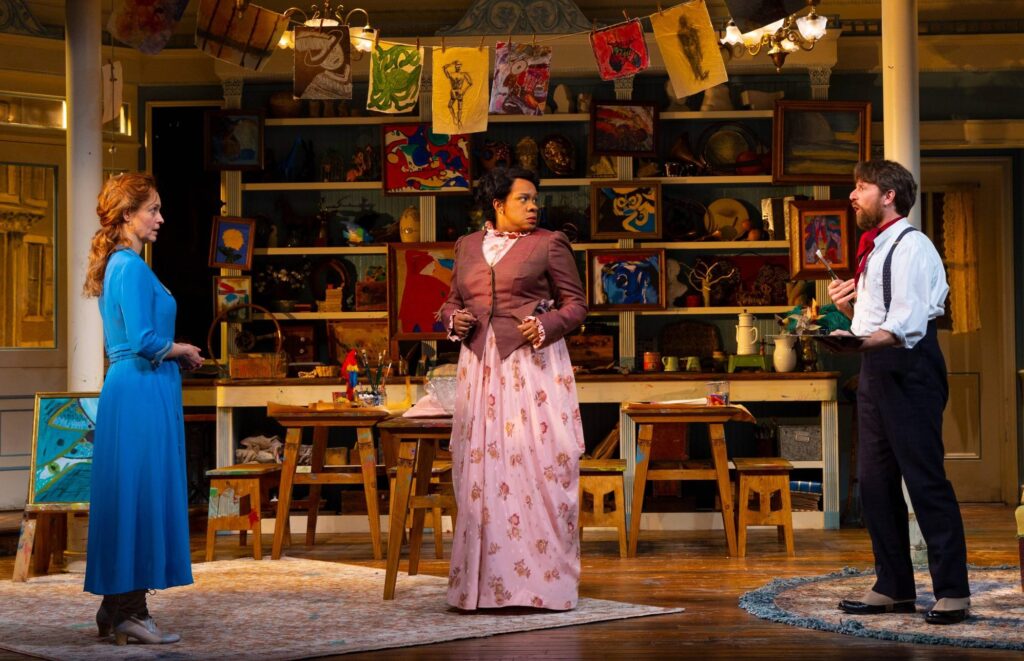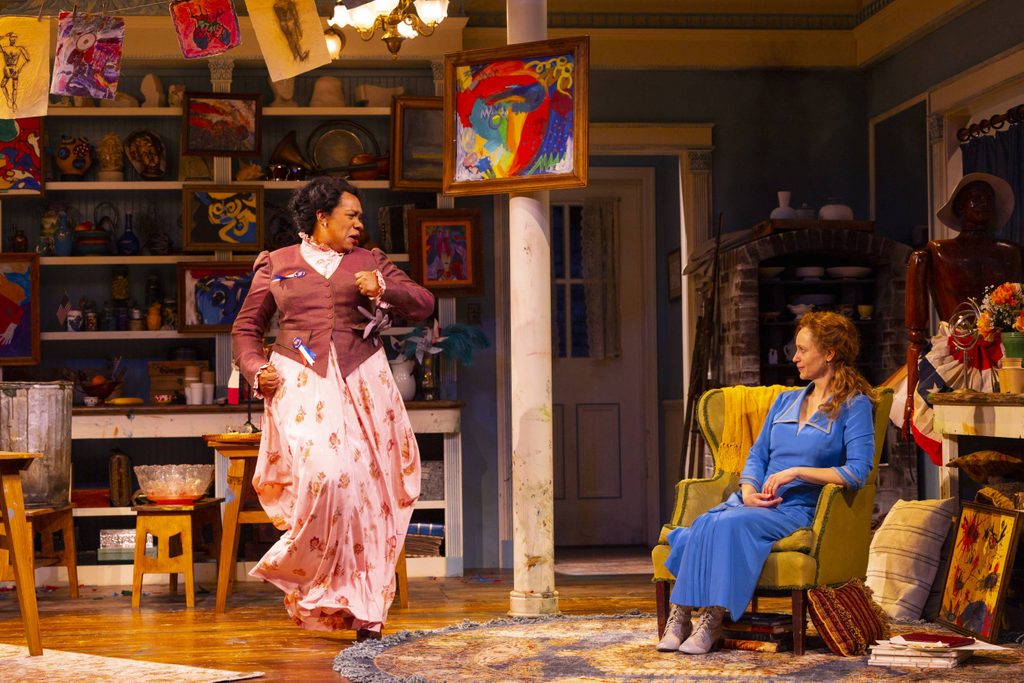
Photos by T Charles Erickson
“Joy and Pandemic” by Taylor Mac. Directed by Loretta Greco. Scenic Design: Arnulfo Maldonado; Sound Designer and Composer: Fan Zhang; Costume Design: Sarita Fellows; Lighting Design: Jen Schriever. Presented by The Huntington, Calderwood Pavilion at the BCA, 527 Tremont Street, Boston, through May 21.
by Michele Markarian
Joy (Stacy Fischer) and her unenthusiastic second husband, Bradford (Ryan Winkles), are running an art school for children in Philadelphia, a venture which Bradford’s mother, Rosemary (the magnificent Marceline Hugot), disapproves of. Joy’s daughter Pilly (Ella Dershowitz) is Joy’s biggest fan. The annoyingly sunny Joy is a Christian Scientist who peppers her conversations with phrases like, “All we need is an invitation to see things differently” and “fear is a lie that we tell ourselves” while insisting that everything and all beings are “perfect.” In a bit of foreshadowing in response to some clanging chimes Joy has over her front door, Rosemary snarls, “Must optimism always be so piercing?” With a visit from Melanie (Breezy Leigh), the staccato-voiced black mother of Marjory, one of Joy’s prized students, Joy is about to find out how imperfect she is.

In keeping with the adage, the more things change, the more things stay the same; Mac sets his play in 1918, during the flu epidemic and the end of WWI. Joy’s Christian Scientist beliefs make her scoff at the flu; fear and sickness are manifestations of one’s separation from God. She refuses to see any danger and won’t close down her school as a result. Melanie frets that Bradford has made a vulgar pass at her because she’s black, making her prey to his disrespect. She also bemoans the advent of the impersonal nature of the telephone, claiming that “ it’s made us ghosts.” It could be my weekly rant about the internet. And Taylor’s firsthand knowledge of Christian Science – his mother was a Christian Scientist – is spot on. Years ago I had a secular friend who worked at the Christian Science Monitor who complained that the place was a petri dish for germs. As it was considered a separation from God to be sick, illness was always around and freely shared by employees who claimed to feel fine.
Act Two takes place in 1952, during the polio epidemic. Joy is on her deathbed, harboring some long-felt shame, and a grown-up Pilly (Fischer, in an excellent turn) is taking care of her. A visit from a former student and lesbian painter, Marjory (Hugot), puts Pilly’s faltering belief in Christian Science in perspective. “She is your religion,” Marjory tells Pilly, referring to her mother. Marjory also has mommy issues, as Melanie died of the flu shortly after we see her in Act One.

Arnulfo Maldonado’s scenic design is wonderful, effectively conveying the cluttered bohemian sloppiness of the art school in Act One, with the more pared-down, austere home in Act Two. The acting is terrific, and Greco keeps the pace lively and lifelike, particularly in an extended telephone call between Pilly and her brother Chris (unseen). Something in the piece, though, felt unresolved to me – somehow, the ending wasn’t enough, the feeling Pilly had for her mother and what it would mean for the rest of her life, alone. The audience isn’t left with any real possibility for Pilly – we don’t know enough about her character to assume she’ll be fine, as we do Marjory. The fact that the play is being watched so soon after the COVID pandemic made me shudder and twitch each time someone in the audience coughed. Yet I found the characters’ distresses and denials to be oddly comforting, a sign that maybe we aren’t living through the worst period of history after all. For tickets and information, go to: https://www.huntingtontheatre.org/whats-on/joy-and-pandemic/

